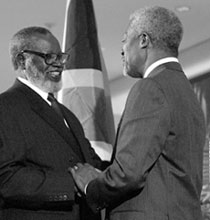GINNEWS

Photo: AFP
WINDHOEK (GIN)–frustrated over the slow pace of land transfers from Whites to landless Blacks, a Namibian government minister warned that the country may move to expropriate White-owned farms if White farmers continue to resist land reform.
“There is a (provision) in our constitution that private assets can be expropriated in the public interest. Fair and just compensation must be provided to those who had laid claim to that property before,” said Foreign Minister Hidipo Hamutenya in an interview.
He said no decision had been made yet on expropriation, but farmers would be compensated for their land, and he did not foresee Zimbabwe-style land seizures in his country.
Zimbabwe’s often-violent land seizures have helped to plunge the region’s second largest economy into crisis.
“So the government might go for expropriation. We may not have to see it if people can be reasonable,” said Mr. Hamutenya, who was speaking on the sidelines of a regional summit in Angola.
Indigenous Namibian tribal groups lost almost all their property during the 1904-07 colonial war with Germany. Namibia, formerly Southwest Africa, became a South African protectorate when Germany lost World War I, and won independence in 1990.
White farmers currently own about 74.1 million acres of the land in Namibia, while Blacks hold 5.4 million acres.
Mr. Hamutenya said 192 farms owned by absentee landlords would be first on the list if expropriation became government policy.
Namibian President Sam Nujoma raised alarm bells in August when he backed Zimbabwean President Robert Mugabe’s program to acquire without compensation 2,900 of the country’s 4,500 White-owned commercial farms for Black resettlement.
Mr. Nujoma called Namibia’s willing-buyer, willing-seller policy “too slow, cumbersome and very costly” and said his government may look at other legal means to acquire land.
Foreign investors want to see orderly land reform in the region, but are worried that illegal land grabs could spread. Those concerns have helped undermine the value of the South African rand, to which the Namibian dollar is pegged.
Mr. Hamutenya said his government had appealed to the European Union to help fund land reform in Namibia.
The government sets aside $1.9 million annually for land purchases, but White farmers say it’s not enough. Last year, they offered the government 171 farms, but only 20 farms were bought.
“We want the EU to make a contribution, to give us money for those reforms. Once they’ve agreed to the principle that they will contribute, then we’ll talk about the figures,” he said.
Namibia was not among the six southern African countries listed by the United Nations as facing the threat of famine this year.
But some 300,000 Namibians will need food aid this year. Mr. Hamutenya said his government had set aside $9.5 million to handle emergencies such as the drought this year, and he did not foresee the need for foreign aid.
Southern African leaders urged foreign donors Oct. 2 to speed up food and debt relief for the region where more than 14 million people in Zimbabwe, Zambia, Lesotho, Malawi, Swaziland and Mozambique face starvation.












